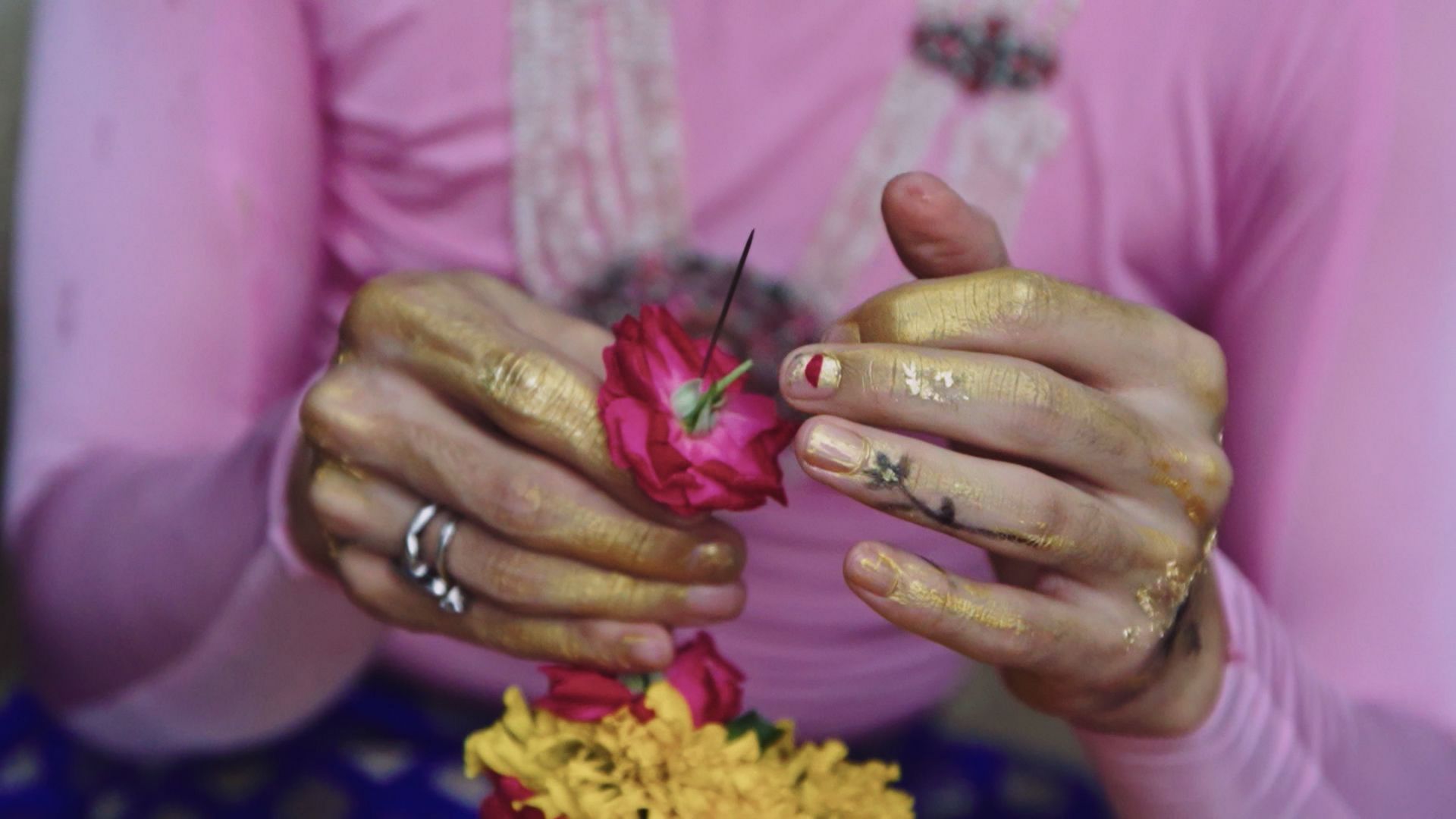Formally, geographically and thematically, the works represent a broad spectrum: compilations like “Playback” about the drag and trans*community of the 1980s in Cordoba, Argentina, a portrait of the Ghanaian performance artist “Va-Bene”, and the audio-visual essay “Galatée à l’Infini” about the subjugation of the female body. Here, physicality is a key to liberation. It is the starting point not only for a search for new forms of expression, but also for breaking free, as with the immersive poetic reflections on queerness in “Journey to the CharBagh” and “Pirate Boys”. Self-determination and appropriation are carefully celebrated in “Batería”, where a lonely camera roams a very special cruising area – and longs for utopian spaces in the present. The film programme was put together as part of the online project “Out and About: Queer Visibilities in the Collection”.
The streaming has ended.
Programme
Brenda Jorde, Va-Bene, GH/GER 2018, 11 Min.
Va-Bene is a performance artist but instead of standing on a stage walks the streets challenging passersby: What is seen, how is it seen? Every day Va-Bene becomes a figure of art, a political subject. Va-Bene’s life and art are interwoven. For Va-Bene the expressive power of femininity offers potential for political confrontation. To use that potential, Va-Bene first had to deconstruct restrictive learned ideas – sometimes religiously tinged – about ‘gender’. Art is a tool, a value in itself, a therapy and a response to oppression – and also embedded in power structures. “I am not an African artist. I am an artist thats happens to come from Africa.” Brenda Jorde’s sprightly documentary portrays a passionate performance artist with a strong impulse for change.
Damian Sainz, Batería, CU 2016, 16 Min.
A ruin in the jungle. The lone camera moves slowly through abandoned rooms to the accompaniment of the atmospheric sounds of the forest, in the background the nearby city. The camera gropes along dilapidated walls full of traces left by former occupants. Caricatures of desire, of presence: we were here, this is important. A voice off talks with empathy about the secrets of the place that plays the lead role in this film by Damian Sainz. The building, once a fortress in the port of Havana, then a military base and a museum, is now a retreat for gay men. A special cruising area, secluded and timeless, associated with hopes for a utopian space, with the yearning for a sheltered place and a safe life where gays can be among themselves.
Pol Merchan, Pirate Boys, GER 2018, 13 Min.
How do people read bodies, and how their scars? “Twirl”, a portrait of punk writer Kathy Acker (1947–1997), is the starting point for a conversation with intersex photographer Del LaGrace Volcano (*1957) about queer ties, gender identity and transformation. The two artists shared a rejection of the meanings attributed to ‘female’ and a desire for hybridity. This hybridity also lends formal expression to “Pirate Boys”, shot with Super 8. In a mix of documentary, fiction and performative exploration, Pol Merchan raises questions about trans subjectivity and revolt: “When the body is the only place to return to, perhaps it’s time to begin preparing the ground for the next transformarion.” “Pirate Boys”, filmed at the “Tuntenhaus” – the “queer house” in Berlin occupied in 1981 – is in part a homage to the punk era associated with Kathy Acker and her anti-formalist novels. Pol Merchan combines extracts from her novel “Pussy, King of the Pirates” (1995) with the inherent language of the body – and offers gender-queer outlaws a new home.
Agustina Comedi, Playback, AR 2019, 14 Min.
“Night after night, with every playback, we robbed the divas of a bit of the eternity the world denied us,” declares a voice off in Agustina Comedi’s moving documentary. Córdoba, Argentina, in the late 1980s: trans women and drag queens celebrate themselves and life. It is a time for sheer survival in a Catholic, conservative country just after the military dictatorship. “Because if we didn’t give ourselves awards, who was going to do it?” In 1983 the regime falls, the restrictions slacken a little. That same year the shows begin: On stage – but only on stage – the film’s protagonists are allowed to ‘dress up as women’. Night after night they sing and dance, display their costumes and their wounded souls. A breath of freedom is in the air. Then comes the Aids crisis. Friends die. Friends who had only just been on that stage. Together with “La Delpi”, the only survivor, director Agustina Comedi imagines a happy ending. “Playback”, compiled with delightful, moving VHS footage, projects the underground bar shows onto the big screen and tells a piece of queer history.
Abdullah Qureshi, Journey to the CharBagh, FI/PAK 2019, 17 Min.
Heavy breathing, howling wind, snorting horses, fluttering birds. A lion roars, water boils, then the music begins: “Journey to the CharBagh” is an immersive audio-visual experience. Drawing on Sufi traditions of interpreting Islamic sacred texts that celebrate love and equality, Abdullah Qureshi’s exploration of queerness and cruising is hauntingly powerful. His poetic, experimental film is at once a quest and a statement. It tells of Buraq, a winged mythological creature resembling a horse, with an ability to fly to heaven and meet terrestrial and celestial beings. Thus begins the journey towards a spiritual, queer awakening, a journey through the uncharted regions of loss. “Can you suffer?” asks the film – celebrating redemption. The visuals draw on selected characters from the paintings of Anwar Saeed (*1955) as well as on the director’s personal memories and encounters. Conversations with queer Muslim friends likewise inspire the lyrics composed by musician and producer “ZĀN”.
This film screening has been organised jointly with and thanks to the kind support of the XPOSED Queer Film Festival Berlin.
Julia Maura, Mariangela Pluchino, Ambra Reijnen, Maria Chatzi, Fátima Flores Rojas, Galatée à l’infini, ES 2017, 17 Min.
Anatomical drawings of female genitals, early film footage of factory production, adverts for rubber dolls and sex robot women – “Galatée à l’infini” is a rousing audio-visual essay full of highly associative montage about the subjugation of the female body. The springboard is the myth of the sculptor Pygmalion who – turned misanthropic by bad experience – created his own ideal woman and then brought her to life. In the cinematic adaptation, Galatea is at first infertile, but Pygmalion’s advisors – historical greats of 17th- to 20th-century medicine – find ways to make her conceive. The film thus interweaves ancient myth with the history of gynaecology and its age-old hostility to female sexual desire, exposing the primacy of reproduction and linking this to economic production.
This film contains images of human genitals and medical interventions that some viewers may find disturbing.

